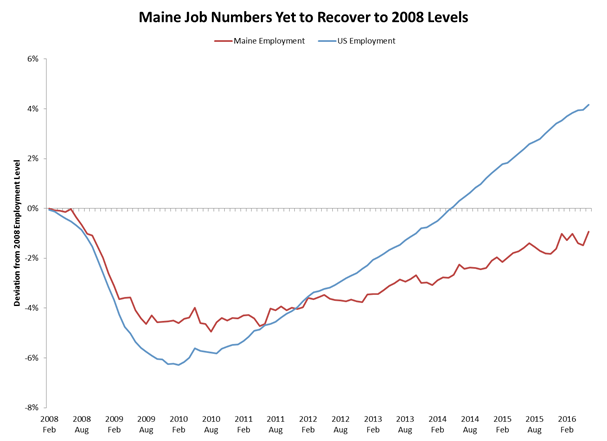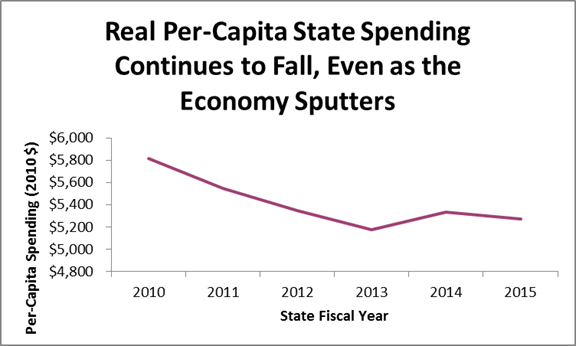Conservative fiscal policies at the state and national level have been a key cause of the lackluster economic recovery following the Great Recession, according to a new report from the Economic Policy Institute (EPI). EPI’s findings are especially relevant for Maine; while EPI cites the post-2009 recovery as one of the longest on record, Maine’s recovery has been even slower. The U.S. economy recovered its pre-Recession employment levels 51 months after the trough of the recession. Maine is still waiting after 84 months for its employment levels to recover. EPI identifies short-sighted policies like cutting public spending, failing to invest in infrastructure, and refusing to accept federal monies as causes of this slow growth recovery. While Maine has suffered under these poor policy choices, there’s still opportunity to reverse them, and get our economy back on track.

Source: Bureau of Economic Analysis, Current Employment Survey
EPI states that “the most direct way for policymakers to fill the [gap in economic output] that is underlying a recession is through public spending,” and faults the U.S. Congress for pulling back on stimulus spending after 2010.This represents a departure from government policy following other recent recessions since the 1980s, when administrations from both political parties cooperated to boost public spending to shore up the national economy.
Maine has experienced a similar trend of falling per-capita spending on a real basis, driven largely by Governor LePage’s ideological commitment to shrinking government. From the bottom of the recession in 2010, Maine’s per-person state spending has shrunk. This has meant less spending on education and training for laid-off workers, a smaller safety net to help people get back on their feet, and an infrastructure that continues to crumble and hurt businesses.

Source: Maine Office of Fiscal and Program Review, National Association of State Budget Officers
Maine can correct its course and jump-start its economy again, by making sensible investments in key areas and taking advantage of the opportunities presented by bonding and federal monies. Rather than perennially delaying bond issues, Maine should take advantage of record-low interest rates and the state’s continued strong credit rating to borrow responsibly to repair our roads and highways, invest in our education system, and ultimately create more jobs and skilled workers.
This November’s ballot initiative on raising additional funds dedicated to Maine’s K-12 education system through a surcharge on the wealthiest individuals offers another opportunity to increase state funding that create significant long-term economic benefits by tapping a new revenue source.
Finally, the governor and the Department of Health and Human Services have consistently rejected $350 million a year and 4,000 new jobs. Accepting federal funding to restore MaineCare coverage to tens of thousands of Mainers would not only improve the health of our workforce, but provide a shot in the arm for the economy. To date, 31states (14 of them led by Republicans) have seized this single largest federal funding opportunity for decades, while Maine remains a member of an increasingly-shrinking minority rejecting this opportunity to improve health care and boost our economy.
While the rest of the country has pulled itself back into economic growth, Maine is still waiting. If Governor LePage’s fiscal austerity continues to prevail, it will be long wait.



